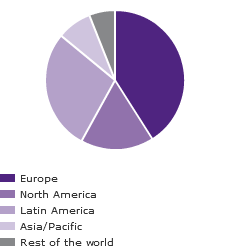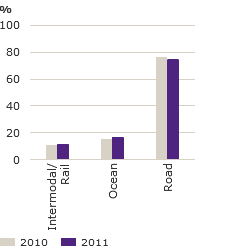Electrolux is committed to growth that’s sustainable – delivering long-term value to customers, employees, shareholders and the wider world. Every year, the Group raises the performance bar by integrating sustainability priorities more deeply into the business.
Electrolux aims to be the best appliance company in the world. The Group’s objective to keep its position as sustainability leader, and realizing the supporting sustainability strategy are key contributing factors to achieve this.
The sustainability strategy
The Electrolux sustainability strategy is geared at seizing opportunities for new business models, products, materials and markets, while soundly managing ethical, social and environmental risks. The strategy is underpinned by a range of targets for achieving more eco-efficient operations and products, as well as absolute targets for chemicals use, ethics and conduct, transparency and safety.
Identifying priorities
Sustainability priorities are both determined by elements of the business strategy - products, brand and operational excellence - and the issues of greatest importance to stakeholders. Stakeholders include those most affected by the business and most critical to company success.
The Group has developed a materiality process to identify priorities and align the sustainability strategy and annual performance reporting with issues of importance to stakeholders.
Electrolux monitors issues across the entire product life cycle and keeps track of the priorities of key stakeholder groups through dialog, surveys, market intelligence and media reviews. To stay ahead of the trends, it also consults other stakeholders, including government contacts, industry peers, opinion leaders and socially-responsible investors, as well as sustainability management and reporting standards such as ISO and the Global Reporting Initiative (GRI).
This materiality process was further developed this year. It now includes stakeholder group prioritization, and an analysis of the sustainability impacts on different aspects of the business strategy.
Defining sustainability leadership
Great business leadership is about meeting today’s needs and turning tomorrow’s challenges into opportunities. For Electrolux, it means growing sustainably with the greatest integrity and the best environmental performance. It’s about improving people’s lives by understanding new needs and delivering smarter, more efficient solutions to more people around the world.
Products, services and markets
- Innovative, energy- and water-efficient products
- Phasing-out hazardous materials
- Design for recycling and using recycled material
- Growing the market for more efficient products
- Designing products for the growing middle class in emerging markets
Cutting carbon where it counts
The product life-cycle approach guides the Group in reducing its carbon footprint by indicating the carbon dioxide impact of raw-material extraction, manufacturing, transportation, use and end-of-life treatment.
Source: Öko Institute.V.‘s LCA of a washing machine, 2004.
With over 70% of the total environmental impact of appliances occurring during use, improving product efficiency is the most relevant issue from a lifecycle perspective. It is also where the company can make the greatest difference in lowering consumers’ environmental footprint.
Lowering environmental impact
During 2012 product targets for energy- and water reductions and chemical use in all major markets will be defined. Electrolux has demonstrated progress on efficiency improvements over a long period. For example, today’s energy class A++ refrigerator/freezer consumes 66% less energy than an average appliance from 1995; an improvement from 574kWh/year to 196kWh.
Challenges remain to implement further improvements in the Group’s product fleet. These include raising the bar on product efficiency, and continually phasing out hazardous materials.
As part of its 2015 goals, the Group will increase investment in advanced technology by 20%. The R&D priorities are to innovate products for energy efficiency and design for recycling.
The learnings from implementing the European RoHS Directive and REACH regulation have been used for updating the restricted materials program across the Group. Electrolux revises its Restricted Materials List every year, resulting in more stringent requirements for suppliers.
Growing the market
Efficient products are crucial to continued business success. Each year Electrolux identifies new criteria for the most environmentally sound appliances among all Group products. Each market has a Green Range of energy- and water-efficient products based on these criteria.
Group business units must report on yearly sales of these products as a proportion of the entire product range. In 2011, sales of the green ranges accounted for 7% of sold units and 15% of gross profit, confirming that products with outstanding environmental performance generate higher profits.
The challenge of growing the market for the most efficient products is ongoing, and despite the economic downturn, there is market promise. Energy efficiency and other environmental messaging have played a larger role in marketing efforts.
In line with its business strategy, the Group also sees strong potential for growth in emerging markets where a rising middle class is placing increased strains on limited resources such as water and energy.
Global Green Range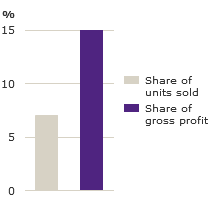
|
Consumer products with the best environmental performance accounted for 7% of total units sold and 15% of gross profit. |
People and operations
Core issues:
- Reductions in energy, water, waste and emissions
- Ethical business practices
- Health and safety
- Human rights
Reducing environmental impacts and doing business with integrity reduces risks, raises the employee brand and reduces costs. Compared to 2005, Electrolux has saved more than SEK 300m this year in energy costs through energy reductions targets.
Reducing the environmental footprint
Electrolux exceeded its 2012, 28% energy savings target by 8 percentage points, a year ahead of schedule. The Group thereby consumed 36% less energy than the 2005 benchmark and emitted 230,000 tons less carbon at similar production volumes. To maintain momentum, the company has decided on a one-year target of an additional 3.5% reduction for 2012, pending finalization of 2015 targets.
Performance is also in line with the company’s 2014 reduction targets for water (20%) and transportation (15%).
Training, measuring and monitoring
Electrolux is founded on the operational values of ethics, integrity, respect, diversity, safety and sustainability. These are embedded in the governance structure through the Code of Ethics, Code of Conduct, Environmental Policy and related management practices.
Target-setting, data collection, training, employee appraisals, surveys and compliance monitoring help ensure the Group lives up to these principles. Of 29 (20) plants located in risk-defined regions, 14 (11) operations were audited by combined teams comprising both Electrolux and third party auditors. Values, principles and sustainability are integrated into leadership programs. In total, 55 (700) workshops were held, with 1,000 (8,000) employees taking part.
The Group receives employee feedback through engagement surveys conducted every 18 months. The first attempt to gauge company culture was launched in 2010: around 80% viewed Electrolux as an organization that acts with integrity. Competence development and fair treatment in rewarding performance were, however, identified as areas requiring improvement.
In total, 9,400 new employees were added to the Group through acquisitions of Olympic Group in Egypt and CTI in South America. During the year, Electrolux initiated a program of alignment with the company strategy, values and principles for Olympic. A collaborative approach was adopted to identify differences in practices and areas for improvement. Relevant issues that are addressed primarily include employment practices as well as safety and environmental performance. Action plans are currently under development. In 2012, work will continue with the Ukraine – factory operations purchased in 2010 – and acquisitions of CTI.
An ethical approach
To enhance employee understanding of Group expectations for personal and corporate ethical accountability, an ethics program was rolled out. This includes an ethics helpline operated by a third party, where employees can confidentially report suspected misconduct. Latin America was the first to launch the program by training 8,100 blue and white collar staff members. An extensive educational campaign included workshops for management as well as factory workers, e-learning and information materials. The helpline for Latin America also opened in June 2011. In 2012, the ethics program will be rolled out across Europe.
Safety net
Electrolux aims to operate 25% of manufacturing facilities at best practice levels for health and safety by 2016. The global health and safety management program includes monthly safety statistics from all major appliance operations and three of four small appliance factories. Electrolux Professional has its own program aligned with Group ambitions, yet tailored to operational challenges of dealing with more hand-crafted products.
Employee surveys gauge perception of H&S performance. In 2011, major appliance manufacturing hit a record-low incident rate of less than 1.0, marking a 50% reduction in incidents since the more comprehensive safety program began in 2010.
The total case incident rate decreased by 42% (21), while workdays lost due to injuries decreased by 36% (9).
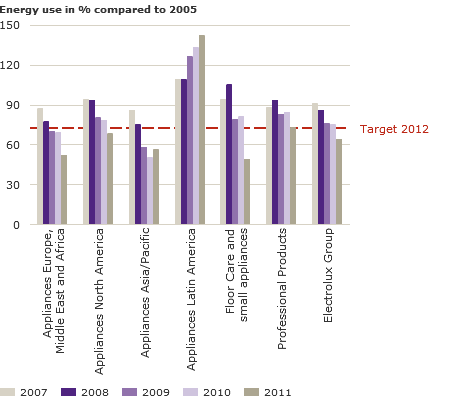
Stakeholders and society
Core issues:
- Responsible sourcing
- Restructuring
- Strategic partnerships
- Dialog
- Transparency and accountability
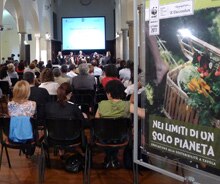
Electrolux aims for honesty and transparency regarding its actions and impacts. It engages in issues that affect its industry and addresses these along the value chain. This helps the Group earn stakeholders’ trust, find solutions and reinforce its role in society.
Responsible sourcing
Electrolux aims to embed high standards for labor, the environment and human rights in its business relationships. The proportion of procurement from low-cost countries increased from 30% in 2004 to approximately 60% (56) in 2011, and is expected to reach 70%. Compliance with the Workplace Code of Conduct and Environmental Policy are mandatory and non-negotiable criteria in evaluating all potential and existing suppliers.
Using audits, training and reporting, the aim of the Responsible Sourcing program is to build supportive and transparent relationships that uphold suppliers’ high environmental and labor practices.
The program prioritizes suppliers classified as high- or medium risk and sustainability auditors are in place in Asia/Pacific, Eastern Europe and Latin America to monitor performance. In total, 360 (328) supplier audits were performed this year, 327 (271) by Group auditors and 33 (57) by third-party assurers.
Engaging suppliers in Group objectives
To realize its sustainability strategy, Electrolux must engage its entire value chain, including suppliers. The company hosted a workshop with 40 major Chinese suppliers to introduce them to the strategy. An energy reporting standard was also launched, to be piloted in 2012. Such measures help the Group gain better insight into the energy consumed by suppliers and how they are managing it.
Dialog builds the strategy
Ongoing dialog is a crucial component of the company’s strategy. In 2011 Future InSight, a dialog platform, was introduced to further engage stakeholders in the sustainability strategy. The platform includes a strategy report, a blog inviting input to the strategy and an employee discussion forum. Future InSight will form the basis for stakeholder engagement, feeding into both materiality assessment and strategy development.
Restructuring
As a global employer, Group decisions affect individuals and local communities. Whether setting up new operations or managing organizational change, Electrolux aims to do so responsibly, transparently and in dialog with those affected. The restructuring program is relocating over half of production to low-cost countries.
This benefits these regions with jobs, opportunities for local suppliers, knowledge transfer, and improved social and environmental standards.
Closing operations, however, is a difficult process for all involved. Electrolux reduced its staff by approximately 1,870 (900) employees, with operations in Spain, Sweden and the United States particularly affected. When restructuring is under evaluation, a procedure is initiated that addresses local needs and priorities.
After the decision to close or downsize is made, employees are offered assistance such as pre-retirement schemes, training and career coaching. Achieving successful outcomes lies in constructive dialog with unions, municipal authorities and potential investors and in focusing on long-term interests of employees.
Raising awareness
In all markets, Electrolux is engaged in educating consumers. Vac from the Sea, an awareness campaign to highlight the problem of plastic waste in the oceans. The initiative helped spark public debate about need for recycling of plastics, an issue is relevant to the Electrolux value chain. It continues its successful run in Asia and Europe.
Electrolux Appliances North America received the US EPA 2011 ENERGY STAR Partner of the Year award for helping to educate consumers about the ENERGY STAR program and increasing its selection of qualified appliances.

